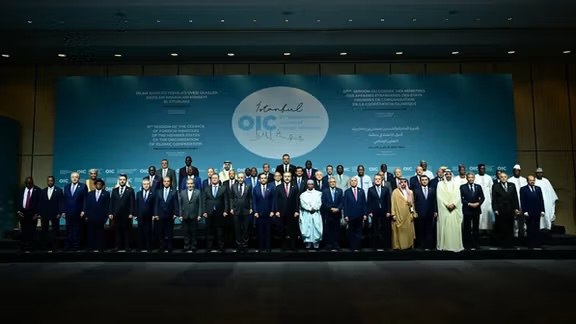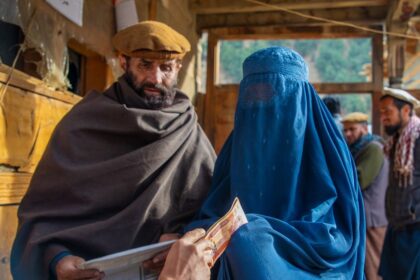RASC News Agency: Despite attending and delivering a speech at the 51st session of the Council of Foreign Ministers of the Organization of Islamic Cooperation (OIC), Amir Khan Muttaqi the acting foreign minister of the Taliban regime was conspicuously absent from the official group photograph released at the end of the summit, further underlining the regime’s continued lack of international legitimacy. According to the Taliban’s Ministry of Foreign Affairs, Muttaqi participated in the high-level session held in Istanbul and engaged in bilateral discussions with several foreign ministers, including his Syrian counterpart. Yet, in a telling omission, the Taliban-controlled ministry refrained from disclosing the content of his speech, and more significantly, the group photograph circulated by the OIC made no room for Muttaqi’s inclusion.
The image featured the official flag of Afghanistan, symbolizing the nation’s enduring identity within the OIC framework. However, the white banner adopted by the Taliban emblematic of a regime yet to be formally recognized by any member of the United Nations was nowhere to be seen. This visual exclusion starkly reinforced the prevailing consensus among Islamic nations: the Taliban’s unilateral rule, built on repression and exclusion, does not meet the criteria for international acceptance. This is not an isolated incident. Muttaqi was similarly absent from official photographs at prior OIC ministerial meetings in Cameroon and Pakistan an apparent pattern that reflects the broader diplomatic discomfort with extending symbolic or formal recognition to a group widely accused of human rights abuses, including the systematic suppression of women and minorities.
The OIC, comprising 57 Muslim-majority countries, has consistently voiced concerns over the Taliban’s extremist policies, particularly its draconian treatment of women and girls. The organization has repeatedly condemned the regime’s ban on secondary and higher education for girls, stressing that such policies run counter to the principles of Islam and universal human rights. To this day, girls in Afghanistan remain barred from attending schools beyond grade six, while universities and most public institutions remain off-limits to women. Core tensions between the Taliban and the OIC stem from fundamental differences on issues such as combating terrorism, forming an inclusive government that reflects Afghanistan’s diverse ethnic composition, and upholding basic civil liberties. The Taliban’s continued unwillingness to adhere to these international and Islamic norms has only further entrenched their global isolation.
In his remarks at the summit, Pakistan’s Foreign Minister Ishaq Dar underscored the centrality of Afghanistan to regional peace and security, urging the Taliban to honor their international commitments particularly on counterterrorism and women’s rights. Despite such appeals, the regime’s hardline stance has shown little sign of softening. Nearly four years after seizing power in August 2021, the Taliban remain diplomatically sidelined, their pursuit of legitimacy consistently blocked by their own oppressive governance. The exclusion of their foreign minister from a symbolic photograph speaks louder than any statement: the Islamic world is not prepared to endorse a regime that betrays the very values it claims to defend.






